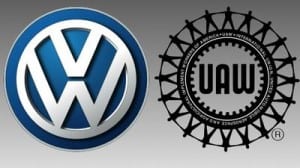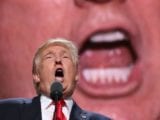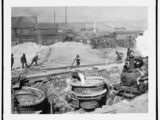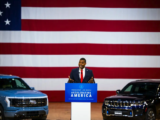Company Officials Now Consider Closing the Chattanooga Plant –
By Glynn Wilson –
The United Auto Workers union has filed an appeal with the National Labor Relations Board claiming outside political interference by special interest groups in Chattanooga, Tennessee, when Volkswagen workers narrowly voted against union representation by 44 votes. Inside sources say now instead of expanding in the state, the plant may actually be closed as a result of the vote.
“It’s hard enough to form a union without politicians and special interest groups interfering and using scare tactics,” the AFL-CIO said in reaction to the news. “A firestorm of interference from politicians and special interest groups threatened the economic future of the plant just before and during three days of voting in an election supervised by the NLRB.”
The filed objections detail a coordinated and widely publicized coercive campaign conducted by Republican politicians and outside organizations such as the Koch brothers to deprive Volkswagen workers of their federally protected right to join a union.
“It’s essentially saying, ‘If you unionize, it’s going to hurt your economy. Why? Because I’m going to make sure it does,’” said Volkswagen worker Lauren Feinauer. “I hope people see it for the underhanded threat that it is.”
The campaign of distortion included threats by Republican Senator Bob Corker, who promised the addition of a new product line being awarded to the plant if workers voted against UAW representation.
“Sen. Corker’s conduct was shameful and undertaken with utter disregard for the rights of the citizens of Tennessee and surrounding states that work at Volkswagen,” the filed objections say. “The clear message of the campaign was that voting for the union would result in stagnation for the Chattanooga plant, with no new product, no job security and withholding of state support for its expansion.”
The UAW, on the other hand, said working together with the Volkswagen Group of America could have set a new standard in the U.S. for innovative labor-management relations that would have benefited the company, the entire workforce, shareholders and the community at large. If successful, it could have been the first European style Works Council established in the U.S.
Instead, it is now being reported that top Volkswagen executives are meeting to discuss the process for closing the Chattanooga plant following the vote. VW management had remained neutral during the voting but indicated the works council would have benefited the working environment at the plant, as it does in the company’s home country of Germany.
“I can imagine fairly well that another VW factory in the United States, provided that one more should still be set up there, does not necessarily have to be assigned to the south again,” said Bernd Osterloh, head of VW’s works council. “The conservatives stirred up massive, anti-union sentiments. It’s possible that the conclusion will be drawn that this interference amounted to unfair labor practices.”
German workers enjoy considerable influence over company decisions under the legally enshrined “co-determination” principle, which is anathema to many conservative politicians in the U.S. who see organized labor as a threat to profits and job growth.
A source close to the discussion inside the company, who chose to speak on the condition of anonymity, said the vote was a “serious misstep” for workers at the plant as well as the politicians who intervened.
“Senator Corker’s remarks assuring voters that if they were to vote against the UAW that VW would announce increasing production at the Chattanooga plant was not only a flat out lie, but could also be considered intimidation in direct violation of federal law resulting in nullification of the vote,” the source said. “Regardless of the outcome, management is deeply disappointed in the climate of the South and is considering relocating the plant to a state that is more friendly to the needs of workers. (It) would be a shame to see these 13,000 jobs moved to California or even Mexico.”
The Chattanooga plant is the only VW factory in the U.S. and the only VW plant in the world without a union. The plant employs about 3,200 non-union workers with more than 9,500 indirect supplier employees and was expected to increase growth in Tennessee by $12 billion, with annual tax revenues of $1.4 billion, according to the company’s website.
Now all that has been thrown into serious doubt.
While the vote keeping union out has been heralded as an important victory for the Southeast’s automobile industry, the election may very well be perceived differently at VW headquarters in Germany, Florian Stamm, a native of Germany and a partner in an Atlanta law firm, told Global Atlanta.
“The perception that there has been a universal sigh of relief among VW’s managers not to have the union in Chattanooga doesn’t hold in Lower Saxony where VW’s headquarters is located,” said Mr. Stamm, who practices corporate international and sustainability law at Smith, Gambrell & Russell LLP and concentrates on the automobile industry.
Lower Saxony, a state in southwestern Germany, is governed currently by a coalition of the Social Democratic and Green parties, which favor workers’ rights.
“VW wouldn’t have minded the union,” Stamm said. “It has probably 100 plants around the world and is used to working with unions.”
When VW managers announced that they would remain neutral in the union drive, local officials were bewildered, including Corker, former mayor of Chattanooga, who holds the widespread opinion that the growth of the Southeast as an automotive center has been based on its foundation of right-to-work laws hostile to unionization.
The vote reportedly went against the union 712 to 626 after a two-year campaign by the UAW. But Mr. Stamm doesn’t think that this is the end of it.
“I assume that the same election will be held again as soon as possible,” he said, with VW retaining its hands-off policy.
VW invested $1 billion to build the plant in Chattanooga. It began manufacturing Passat mid-size sedans in 2011. Manufacture of the new CrossBlue vehicle is scheduled for 2016.















Glynn,
Do you have a good source on VW officials considering closing the plant? A lot of people have been misled by a hoax site, “National Report,” which makes the claim that the plant is closing, and all jobs lost.
I got it from the AFL-CIO. The company and the UAW union are welcome to deny it. So far I haven’t seen a denial. If it’s not true they should issue a statement. I’ll run it.
I agree that VW ought to issue a denial of closing. But, were I advising VW on U.S. politics, I’d say to wait, and let Corker and the Tennessee GOP twist in the wind as long as possible.
Were I advising VW on labor law, I’d point out that announcing an expansion any time soon would add credence to the UAW’s claim of interference, and virtually require another vote under the unfair labor practice rules. I’d also note that if it turns out to be true that VW execs told Corker they’d announce an expansion if the UAW lost, some officials could be open to prosecution and there would certainly be another vote.
But as a pragmatist, I doubt that VW would walk away from the Chattanooga location (good rail, river and road access), after investing more than $1 billion in the plant.
I’m troubled that your report is the only discussion of closing I’ve seen other than the hoax site, National Report.
Still waiting to hear a denial…